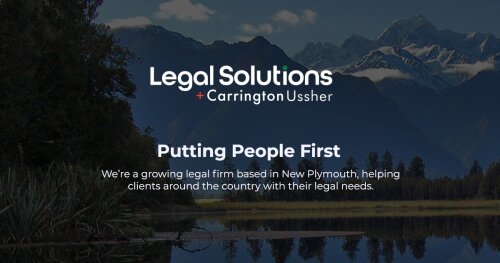Best International Lawyers in New Zealand
Share your needs with us, get contacted by law firms.
Free. Takes 2 min.
Or refine your search by selecting a city:
List of the best lawyers in New Zealand
About International Law in New Zealand
International law in New Zealand governs the relationships between countries and individuals on a global scale. It covers various areas such as trade agreements, diplomatic relations, human rights, and more. As a country that relies heavily on international trade and diplomacy, having a good understanding of international law is essential for individuals and businesses operating in New Zealand.
Why You May Need a Lawyer
There are several situations where you may need a lawyer specializing in international law in New Zealand. Some common scenarios include disputes with international partners, navigating complex trade agreements, seeking asylum or refugee status, or dealing with issues related to global human rights violations. A lawyer with expertise in international law can provide valuable advice and representation in these situations.
Local Laws Overview
New Zealand has a set of laws that govern international relationships and interactions within its borders. Key aspects of local laws that are particularly relevant to international law in New Zealand include the Treaty of Waitangi, which is a founding document that governs the relationship between the Crown and Māori, and the Immigration Act, which regulates the entry and residency of individuals in New Zealand.
Frequently Asked Questions
1. What is the role of the Ministry of Foreign Affairs and Trade in international law in New Zealand?
The Ministry of Foreign Affairs and Trade is responsible for representing New Zealand's interests internationally and negotiating international agreements on behalf of the government.
2. How does New Zealand participate in international treaties and conventions?
New Zealand can become a party to international treaties and conventions by signing and ratifying them through the parliamentary process.
3. What is the significance of the Antarctic Treaty System for New Zealand?
New Zealand is a consultative party to the Antarctic Treaty System, which governs activities in Antarctica and promotes scientific cooperation among countries.
4. Can individuals seek asylum in New Zealand under international law?
Yes, individuals who fear persecution in their home country can seek asylum in New Zealand under international law, and there are specific processes in place to assess asylum claims.
5. How does New Zealand regulate international trade?
New Zealand regulates international trade through various agreements such as the Trans-Pacific Partnership and the World Trade Organization, as well as domestic laws governing imports and exports.
6. What are the human rights obligations of New Zealand under international law?
New Zealand is a party to various international human rights treaties and has obligations to protect and promote human rights both domestically and internationally.
7. How does New Zealand address international environmental issues?
New Zealand works with other countries through international agreements such as the Paris Agreement to address global environmental challenges and promote sustainable practices.
8. Can businesses in New Zealand benefit from international legal agreements?
Yes, businesses in New Zealand can benefit from international legal agreements such as free trade agreements, which can open up new markets and reduce trade barriers.
9. What is the process for resolving international disputes under New Zealand law?
International disputes can be resolved through diplomatic channels, arbitration, or through the courts, depending on the nature of the dispute and the parties involved.
10. How can individuals stay informed about international law developments in New Zealand?
Individuals can stay informed about international law developments in New Zealand by following updates from the Ministry of Foreign Affairs and Trade, attending relevant conferences and seminars, and engaging with international law experts.
Additional Resources
For more information on international law in New Zealand, you can visit the Ministry of Foreign Affairs and Trade website or contact organizations such as the New Zealand Law Society or international law firms in the country.
Next Steps
If you require legal assistance in international law in New Zealand, it is recommended to seek advice from a specialized lawyer or law firm with expertise in this field. They can provide guidance on your specific situation and help navigate the complexities of international legal matters.
Lawzana helps you find the best lawyers and law firms in New Zealand through a curated and pre-screened list of qualified legal professionals. Our platform offers rankings and detailed profiles of attorneys and law firms, allowing you to compare based on practice areas, including International, experience, and client feedback.
Each profile includes a description of the firm's areas of practice, client reviews, team members and partners, year of establishment, spoken languages, office locations, contact information, social media presence, and any published articles or resources. Most firms on our platform speak English and are experienced in both local and international legal matters.
Get a quote from top-rated law firms in New Zealand — quickly, securely, and without unnecessary hassle.
Disclaimer:
The information provided on this page is for general informational purposes only and does not constitute legal advice. While we strive to ensure the accuracy and relevance of the content, legal information may change over time, and interpretations of the law can vary. You should always consult with a qualified legal professional for advice specific to your situation.
We disclaim all liability for actions taken or not taken based on the content of this page. If you believe any information is incorrect or outdated, please contact us, and we will review and update it where appropriate.
Browse international law firms by city in New Zealand
Refine your search by selecting a city.















